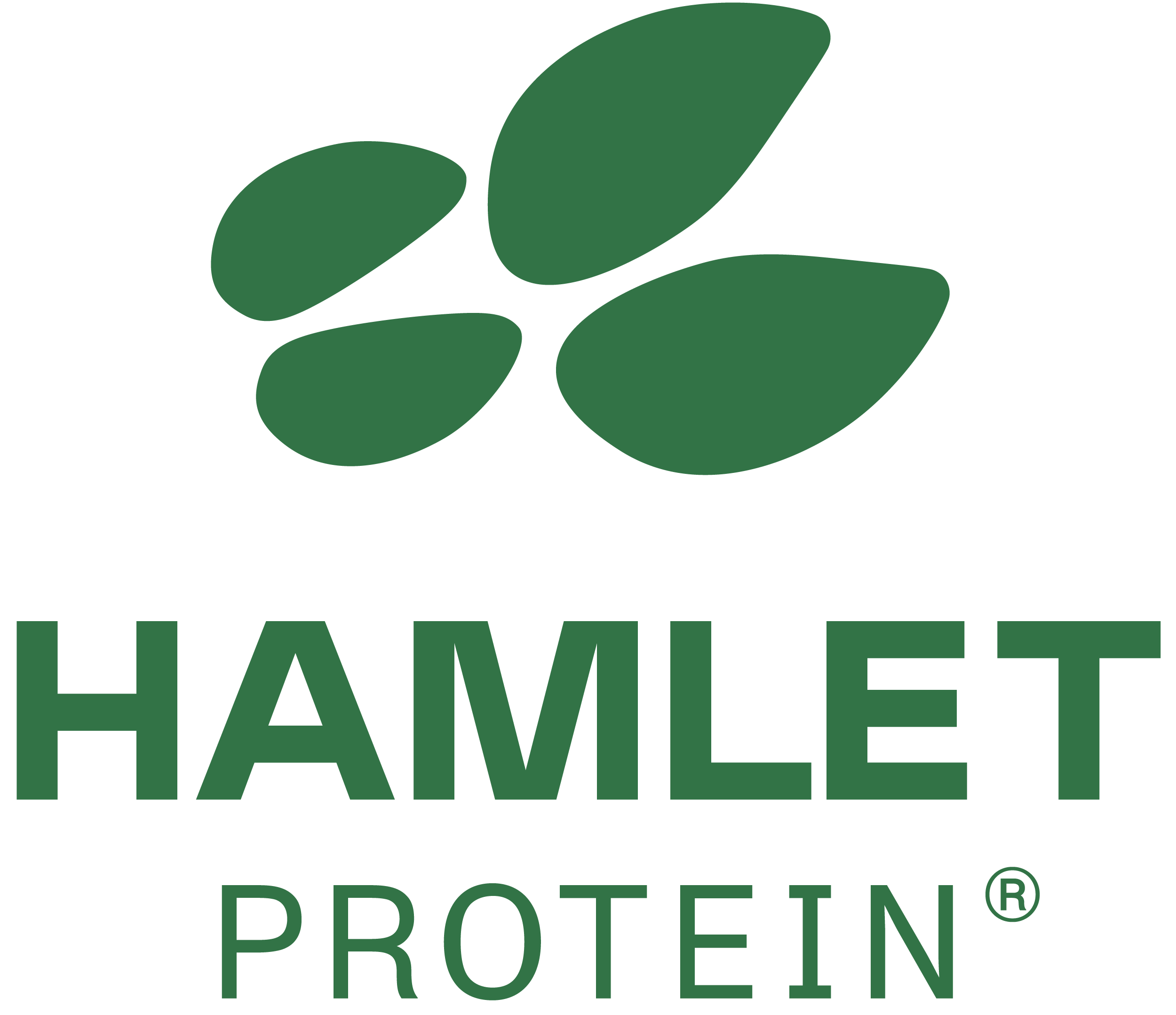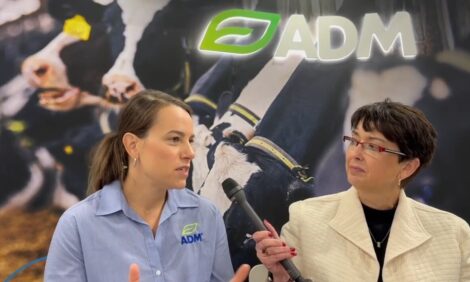



Milk replacer revolution: Enzyme-treated soy protein matches dairy protein performance while cutting costs and emissions
Research shows calves fed HP 100-based replacers performed on par with dairy-only controls and outperformed other plant protein alternatives
A recent trial at the University of Warmia and Mazury (Poland) confirmed that HP 100, an enzyme-treated soy protein, can replace dairy proteins in calf milk replacers (CMRs) without compromising growth or gut health. Calves fed HP 100-based replacers performed on par with dairy-only controls and outperformed other plant protein alternatives.
Hamlet Protein presented these findings at this year’s EAAP Annual Meeting. In addition, the results were displayed during the Smart Calf Rearing Conference 2025 in Madison, Wisconsin in September.
With dairy protein prices climbing and sustainability pressures increasing, producers need solutions that deliver on performance, cost, and responsibility. HP 100 is designed for young calves: highly dispersible, digestible and palatable, low in anti-nutritional factors, and proven to support healthy growth. It represents a cost-effective and sustainable alternative for modern calf nutrition.
The economic case for alternatives
Skimmed milk powder (SMP) has traditionally been a primary ingredient in calf nutrition thanks to its high-quality protein. But prices have surged – doubling for SMP and nearly tripling for whey protein concentrates between 2016 and 2025. The dairy sector’s constraints suggest this trend will continue.
Faced with rising costs, nutritionists and dairy farmers are seeking viable alternative protein sources capable of maintaining, or even improving, calf performance in the pre-weaning phase. Among the options, processed vegetable proteins, in particular soy-based products, stand out for their amino acid profile, which closely mirrors dairy, while hydrolyzed wheat gluten (HWG) also shows potential.
The key is proving performance: the speed of animal growth, feed-protein efficiency, digestive health, and overall sustainability. HP 100, Hamlet Protein’s enzyme-treated soy protein, is specifically developed to overcome the limitations of conventional soybean meal. It offers a proven balance of nutritional value and economic efficiency, making it a strong, science-backed alternative to dairy proteins in calf milk replacers.
Trial design
In collaboration with the University of Warmia and Masuria, a controlled calf study was carried out on a Polish dairy farm from March to November 2024. A total of 56 female Holstein calves were divided into four groups, each receiving a different calf milk replacer (CMR) formulation (Table 1):
- Control with skimmed milk powder (SMP, 100% dairy protein)
- SMP partially replaced by enzyme-treated soybean meal (HP 100)
- SMP partially replaced by hydrolyzed wheat gluten (HWG)
- SMP partially replaced by micronized soybean meal (µSBM)
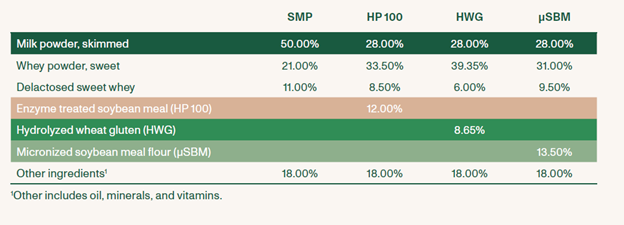
All CMRs were formulated to be isoenergetic (17% fat, 20 MJ GE) and isonitrogenous (22.5% CP). The feeding protocol consisted of providing 4 liters of CMR, twice daily, at a concentration of 160 g per liter. In addition, calves had ad libitum access to solid starter feeds from birth and total mixed rations (TRMs) from day 30 onwards.
Growth performance was monitored by recording body weight at birth and at weeks 5, 8, 11, 15, and 20. Fecal samples were collected and analyzed for dry matter, nitrogen content and pH at weeks 1, 5 and 10.
HP 100 matches dairy and outperforms other proteins
Analysis of growth data revealed clear advantages for HP 100. Calves fed milk replacers containing HP 100 matched the growth of calves on dairy-only replacers during the pre-weaning phase (Figure 1).
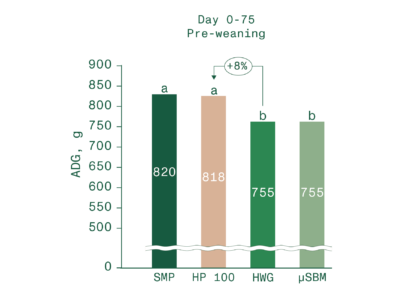
HP 100 also outperformed other plant protein alternatives. From birth to weaning, calves on HP 100 achieved significantly higher average daily gain than those on HWG or µSBM. Over the full 135-day period, HP 100 consistently delivered the strongest results.
Watch the video for more details.
Protein that makes sustainability and efficiency rhyme
This trial also evaluated the impact of protein choice in CMRs on fecal parameters (Figure 2). While pH remained unaffected, calves fed HP100 showed drier feces (higher dry matter, DM %) and significantly lower nitrogen (N %) compared to other treatments.
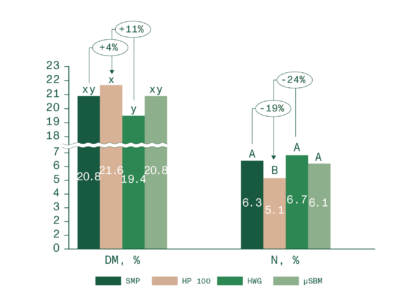
HP 100 formulations improved nitrogen utilization, as shown by the significantly lower fecal nitrogen content, which is an indicator of more efficient protein digestion and body fixation.
Four times cheaper than dairy, proven to perform
Economic analysis highlights the substantial benefits of incorporating HP 100 into calf milk replacer (CMR) formulations. For the same protein input, HP 100 is four times cheaper than dairy proteins (SMP), half the cost of hydrolyzed wheat gluten, and only slightly more expensive than micronized soybean meal. With protein being the major driver of CMR cost, this advantage makes HP 100 a highly competitive option.
Beyond economics, HP 100 supports calf health by reducing anti-nutritional factors, lowering the risk of digestive issues and veterinary interventions. Its consistent quality and easy integration into existing feeding programs make it a practical and reliable choice for modern calf nutrition strategies.
Producers no longer have to choose between cost, performance, and sustainability
For nutritionists, formulators, and feed manufacturers, HP 100 represents a practical, science-backed, and sustainable alternative at a time when dairy proteins are increasingly scarce and expensive. More than just a cost-saving ingredient, HP 100 supports animal health, farm profitability, and sustainability goals.
For more information about HP 100 in CMR reach out to your local Hamlet Protein’s representative.

